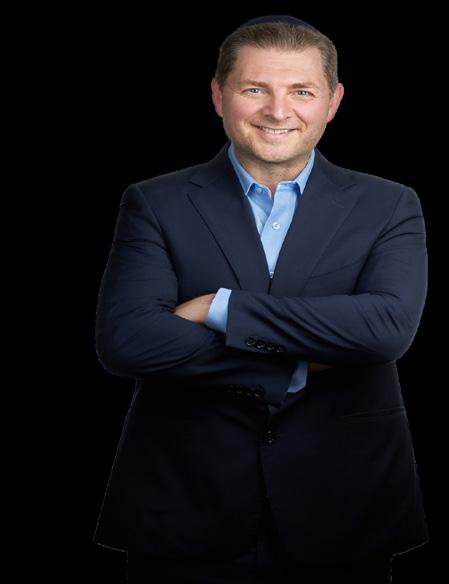




































































Breakstone’s butter delivers rich, creamy flavor for holiday desserts. Tradition starts with quality ingredients— trust Breakstone’s for unforgettable baking.
































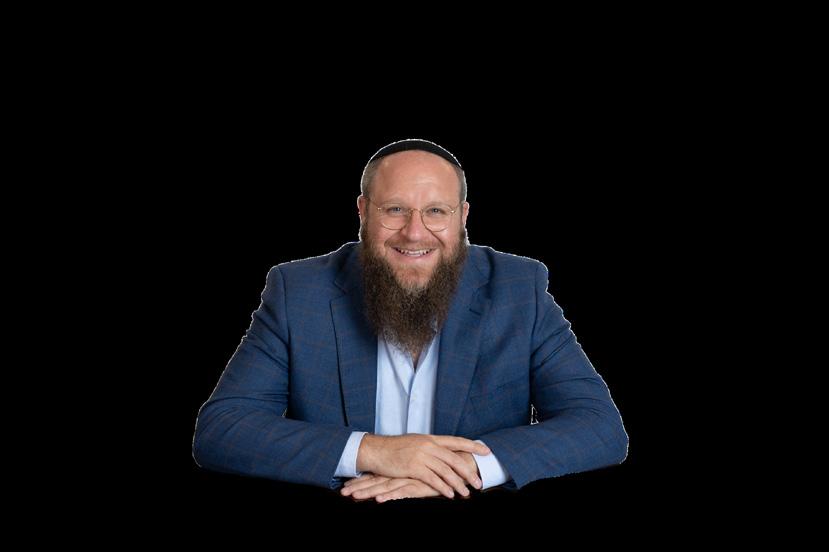























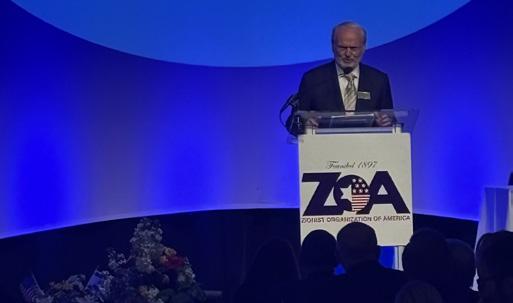
© The South Florida Community Voice Magazine. All rights reserved. Reproductioninprintedordigitalforminwholeorinpartinanyformwithout priorwrittenpermissionisprohibited.Thepublisherreservesallrighttoedit allarticlesforclarity,spaceandeditorialsensitivities.Submissionscannotbe returnedtosender.TheSouthFloridaWeeklyMagazineisnotresponsible for the cash flow of any advertised product or service that appears in thesepages.TheSouthFloridaCommunityVoiceMagazineassumesno responsibilityforthecontentofarticlesoradvertisementsinthispublication, nor for the content of books that are referred to or excerpted herein.
“ It just makes a lot of
sense— YU, in Israel. It’s unlike any other program available in Israel or in America.
Zelig, Teaneck
Achieve Excellence in Torah While Earning a YU Degree in Partnership with Top Israeli Universities


Immersive Torah Studies in a World-Class Beis Midrash Environment with Renowned Rabbeim, Open 24 Hours.
Academic Degrees in Partnership with Leading Israeli Research Universities
Vibrant Student Experience and Residence Life
LEARN MORE AT YU.EDU/YUI ENROLLMENT DEADLINE IS APRIL 23, 2025



“YU in Israel offers a seamless blend of torah learning with a college education. This allows me to grow spiritually while working toward my degree, creating a balance that improves both my Jewish education and my future in Israel.
Miller, Five Towns
Achieve Excellence in Torah While Earning a YU Degree in Partnership with Top Israeli Universities

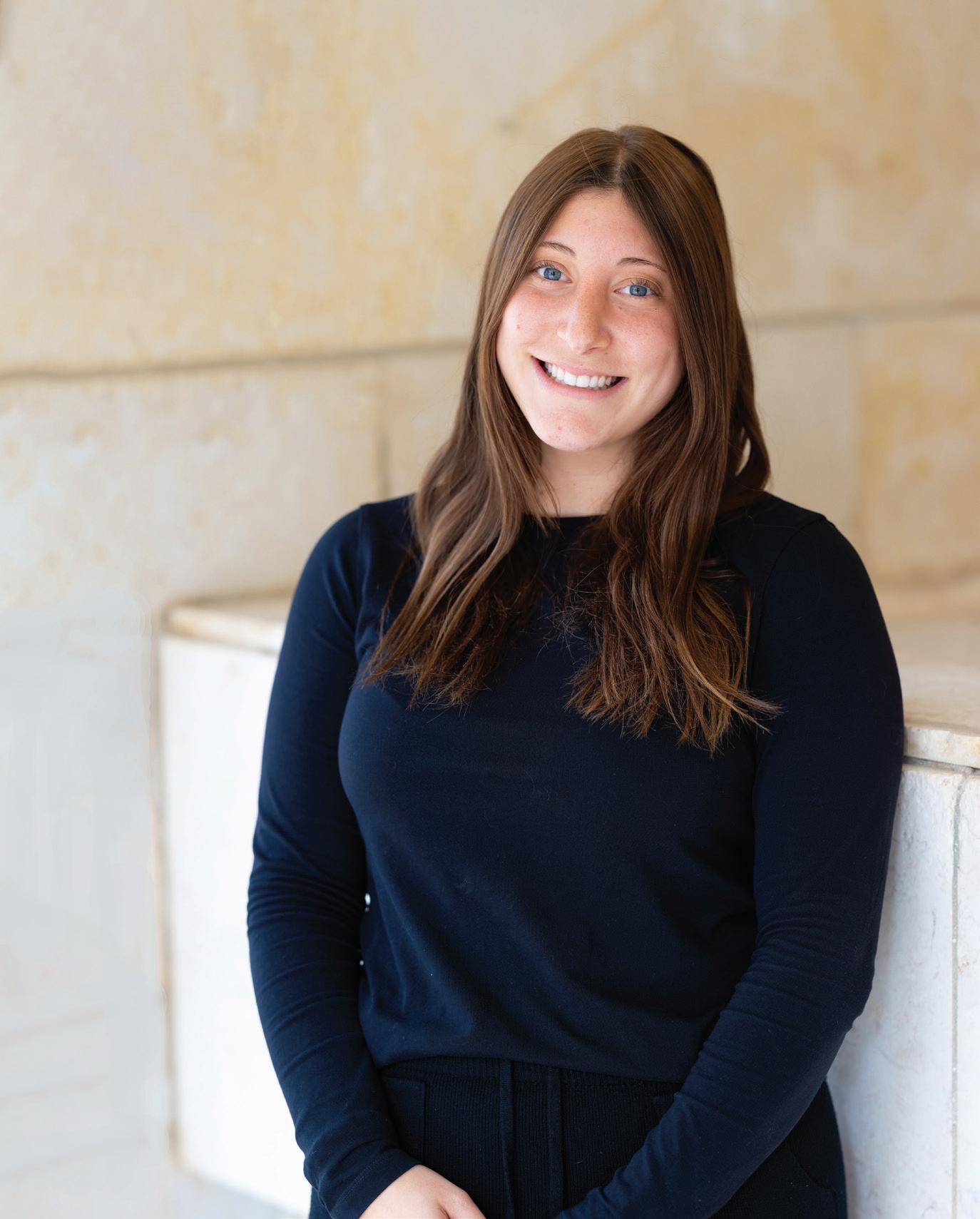
Immersive Torah Studies in a World-Class Beit Midrash Environment with Top Tier Rabbeim and Teachers.
Academic Degrees in Partnership with Leading Israeli Research Universities
Vibrant Student Experience and Residence Life
LEARN MORE AT YU.EDU/YUI ENROLLMENT DEADLINE IS APRIL 23, 2025


By Sivan Rahav Meir
Bring a Chair
I have already written in this space about the need for peak sensitivity during this period, about the need for a safe, nontoxic space. So many people are on edge, struggling emotionally and otherwise. There is such a great need for small human gestures: a hug, some attention. Here is one of the many responses I received. Tali Versano-Eisman, a Home Front Command instructor for children, wrote the following big-little story:
“I visited the kibbutzim in the Gaza vicinity and witnessed the burnt, broken homes. I entered the home of the Bachar family from Kibbutz Be’eri. On October 7, terrorists broke in and set it on fire. They were trapped in their safe room for 22 hours — without water, without toilets. Only one phone connected them to the outside world. Surrounding them were only the sounds of horror, fire, and paralyzing dread.
“When the IDF forces finally arrived, they discovered that the door to the safe room could not be opened. The exhausted family had to be rescued through the small window. When the mother, Inbal Zecharia Bachar, approached the window, her son Maayan said to her simply: ‘Wait, Ima, I’ll bring you a chair.’ It is at this point in the story that Inbal’s voice breaks. Not when describing the terrorists, not the fire that consumed their home, not the endless hours of terror. But at her son’s simple comment.
“In the midst of hell, when
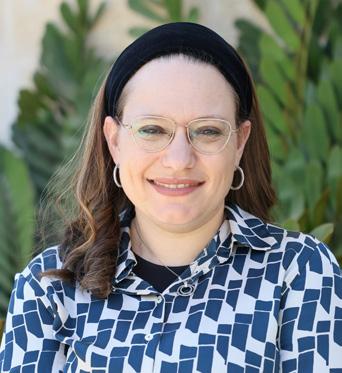
everything was burned and shattered, that chair symbolizes something that the fire could not consume - love, humanity, and care for one another. The simplest and smallest gestures, especially in moments of trauma and mortal danger, reveal the deepest humanity in us. After 22 hours of existential fear, thirst, absolute uncertainty, and terror—the son’s simple concern for his mother’s comfort represents a moment of kindness and love.
“That chair is still there, next to the safe room in Be’eri — a symbol of the resilience of the human spirit and the hope that can sprout even within the darkest moments. Look around and bring a chair.”
Someone told me that this Friday night he plans to make Kiddush and recite the words of “Eishet Chayil.” Why? Because he saw a video of freed hostage Eli Sharabi. With all the “noise” we’re hearing these days, it’s worthwhile
to hearken to Eli’s weak but clear voice. After 491 days in Hamas captivity, he traveled to New York to deliver a speech in the U.N. and then went to pray at the Ohel of the Lubavitcher Rebbe.
After visiting the Ohel Eli said: “I’m not a religious person. I was in the darkest place, 50 meters underground. What gave me strength every day was to recite Shema Yisrael in the morning, to sing Eishet Chayil every Friday night and to make Kiddush — over water because we didn’t have any wine. It gave me and the other hostages so much strength— we felt the power of our faith and it helped us survive nearly 500 terrible days of captivity.”
Rabbi Mendy Kotlarsky, Executive Director at Chabad World Headquarters, asked Eli to convey a message to the Jewish people. Eli, whose wife Lianne and two daughters were murdered by Hamas, said: “With the power of faith it is possible to conquer everything. The power of faith. And unity, our unity, is the most important.”
As our pre-Pesach cleaning is now in full swing, here are a few words from Rabbi Menachem Brod to energize us:
“The word ‘Pesach’ means skipping, jumping, or passing over. Among all the technical preparations for this holiday, let’s not forget the secret message of Pesach — that we have the power
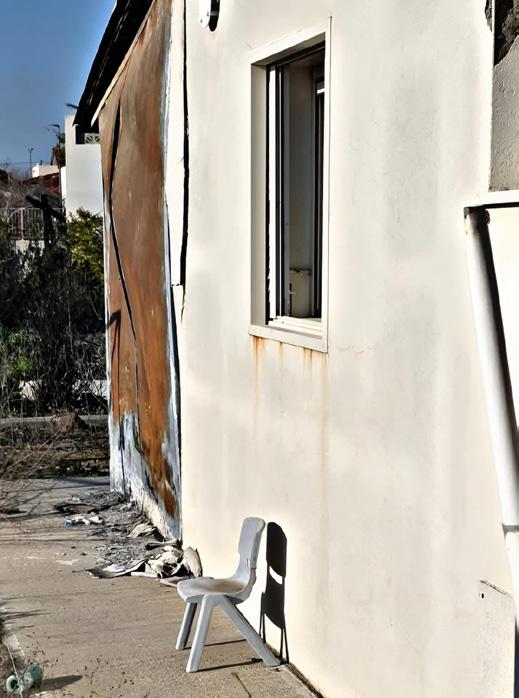
to leap over every obstacle, to save ourselves and be redeemed. That was the situation at the time of our redemption from Egypt. A moment before our deliverance, we were slaves with no idea how our situation could ever change, and then we suddenly left slavery for freedom.
There are times when history moves forward ever so slowly. At other times, as happened on Pesach, there is a sudden rush that leaves the old reality behind as we leap ahead. We break through and step forward into a completely new reality.
The month of Nissan and the holiday of Pesach give us the strength to make this leap. God helps every individual, both on the personal and national level, to rise to the loftiest spiritual heights, to truly change, to merit an abundance of good things. To paraphrase a statement from the Gemara: Just as we were redeemed in the past, so may we be redeemed in the days immediately ahead.”
Translated by Yehoshua Siskin, Janine Muller Sherr

Boca Raton, FL - Katz Hillel Day School of Boca Raton (KHDS) proudly hosted Governor Ron DeSantis as the distinguished guest of honor at its Chanukat Habayit & Tribute Evening held on March 30, 2025, on the Milton B. Katz Campus. In recognition of his unwavering leadership in supporting school choice and enhancing security for Jewish schools, Governor DeSantis was presented with the prestigious Champion of Faith & Freedom Award by KHDS Board Vice President, Amy Tarlowe. Following the award presentation attendees were captivated by an exclusive one-on-one conversation between Governor DeSantis and Ben Shapiro, renowned political commentator and host of The Ben Shapiro Show.
As part of the dedication of the school’s new expansion building, Governor DeSantis joined incoming Head of School Rabbi Mordechai Schwersenski in the ceremonial hanging of a mezuzah, symbolizing the school’s continued commitment to Torah values and Jewish education. The event, which marked a significant milestone for Katz Hillel Day School, underscoring its commitment to fostering strong community values, academic excellence, and unwavering support for faithbased education also recognized six dedicated faculty members for their milestone years of service to KHDS as they received the

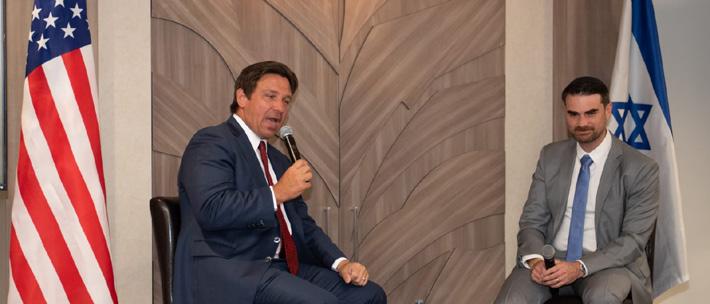
Faculty Dedication Award: Tova Gil, Lauren Glaun, Frieda Greenblatt, Rabbi Yosef Kassorla, Dina Oleyek, and Samantha Witztum. Katz Hillel Day School of Boca Raton is a premier Jewish day school dedicated to academic excellence, religious values, and the security and well-being of its students. Committed to instilling a strong foundation of Torah and general studies, KHDS serves as a beacon of educational leadership in the South Florida Jewish community.
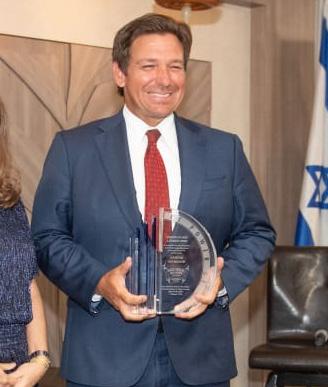












Note: This article does not pertain to any one particular school which this writer is involved, but ratheravarietyofdayschoolsand yeshivot which have shared with me their needs, concerns and experiences. It also reflects a series of in-classroom and school observations on the national level.
Chanoch l’anaar al pi darko –“EducateaChildAccordingtoHis Ways”
(Mishlei/Proverbs, 22).
Over the past several decades, our Jewish day schools and yeshivot have experienced a dramatic increase in the number of students with exceptionalities (learning challenges, styles and/ or special needs).
Whether this phenomenon is the result of a growing demographic shift in the number of students with exceptionalities or more frequent and/or more sophisticated early intervention diagnostics is an ongoing debate.
In light of this reality, I suggest
By Dr. Chaim Botwinick
that it may (underscore “may”) be a combination of the two. In addition, this conversation does not include gifted and talented students who also fall under this classification or category. Instead Part II will be devoted exclusively to the topic of gifted and talented students.
The number of students with exceptionalities and/or learning styles in our day schools and yeshivot is undeniable. To be sure, it is estimated that between 15%20% of our student population have some form of learning challenge or atypical learning and/or behavioral disposition.
When referring to the variety of students with exceptionalities, I include the cognitive, social and emotional aspects or wellbeing of our students.
Although this writer has not worked directly with special needs students in a clinical setting, my experience as a teacher, principal, head of school or senior executive coach in schools, has offered me a variety of credible insights which have informed my thinking, interest and opinion on the subject.
One of the most difficult challenges I have seen when observing schools, are the manner in which teachers, faculty and the administration respond to students with exceptionalities.
Although I am very hesitant to paint a portrait of these schools with a single brush stroke, I am continuously amazed, if not taken
aback by how many schools are not necessarily responding effectively to the wide array of student special needs or challenges present in their respective schools.
As a disclaimer, I must be very clear and up-front by emphasizing that there are a host of Jewish day schools and yeshivot that do in fact respond to this challenge by providing a wide array of state-ofthe-art programs and services for their students with varying learning styles. Having said that, there are also many that unfortunately do not.
Over the past several years, I have visited numerous day schools and yeshivot via a wide range of assignments. Whether on a site visit for an accreditation agency, as a consultant. teacher or as a coach, I have observed a variety of classrooms which were indeed challenging at best from a classroom student management perspective, and are comprised of students who possess significant cognitive, social and emotional challenges.
I use the term exceptionality in order not to classify these students as those with “learning disabilities”. These include students who have a host of learning and attention deficits as well as social and emotional needs.
Parenthetically, I am always extremely sensitive the classification of these students in light of the potential inappropriate “stigma” associated with labels and clinical classifications. My preference has always been to consid-







er these students as those with a variety of different learning styles and social/emotional dispositions; plain and simple.
Either way we define these students, the reality is relatively clear - most require some form of learning, educational, and/or psychological intervention – whether they be remediation, speech and language therapy, psychological counseling and therapy, decoding skills, processing and developmental assistance. And, they are all entitled and deserve the best special services possible – especially if they are enrolled in our Jewish day schools and yeshivot. It is not only an institutional responsibility, but a communal imperative.
The challenge still remains, are these student needs really being met across the board, and if not (which is my assumption), what should be our communal leadership response.
One of the most arduous and challenging realities I have seen when observing many schools and classrooms with these exceptional students is the manner in which many schools (not all) respond to student special learning, social and/or emotional needs and requirements.
The reasons for this perception are many – from the lack of trained faculty and staff, to the inability of teachers, faculty or the administration to fully understand, appreciate or recognize the full extent of student pupil needs or requirements in their own respective classrooms.
Several years ago, I was invited to a well-known and respected
middle and high school yeshiva day school in order to observe several classrooms. The purpose of the visit was to help prepare the school for an eventual accreditation site visit followed by a strategic planning process. These observations took place over two weeks and each classroom was observed several times.
While observing these classes, I was absolutely amazed and taken aback to witness how many students were exhibiting behavioral and discipline issues as well as cognitive processing challenges. In fact, the skills that the teachers were attempting to teach were significantly below their normative of standard grade level. These included, reading and math skills as well as Hebrew language and biblical/Talmudic text study, exacerbated by a lack of student focus, attention and in many cases, understanding.
Mind you, this class was introduced to me by the principal as a normative model classroom environment.
Six months later I visited another very similar school in order to assist them in their “self-study” process. Unfortunately, I observed the exact same result with few exceptions.
Coincidence? Maybe; but, I doubt it.
There are many who would posit that these behaviors and academic deficits may be due in part to the impact of the Covid pandemic on teaching and learning. Then, there are others who strongly suggest that these deficits existed long before the pandemic. However the impact of the pandemic may have affected academic per-
formance more dramatically. In fact. there is a body of research that now suggests that we must be very careful not to understate or overstate the impact of Covid on student academic growth, performance or achievement.
One major finding also strongly indicates that there is a growing body of evidence and data to suggest that weak students became significantly weaker and strong academic students remained the same.
There is also a growing body of evidence to suggests that there are a select group of students who in fact performed extremely well when isolated from normative classroom stimuli or environments. This topic deserved further investigation.
Getting back to the topic at hand….
Following my classroom observations, I was invited to a series of post- visitation review sessions with principals, heads of school, select teachers and school counselors in order to discuss what I had observed in their respective classrooms; and, to suggest or recommend potential strategies or approaches for future consideration.
I began the conversation by asking the group whether any of their students were in receipt of special services such as therapy, remediation, or counseling support. The responses we all basically the same – “just a hand-full of students are receiving private services outside of the school, including those being offered by the public school system” and that school sponsored services were



minimal at best.
I was not totally surprised by these responses. However, I was somewhat disappointed by the cavalier nature of the responses. I would have expected the school leadership to suggest that they desperately require additional resources (human and financial) in order to respond to these unmet student needs; and that not having these resources to support special needs student programs was of major concern.
These responses, and other very similar responses (way to extensive to describe), may suggest that many of day schools and yeshivot are just too overwhelmed with other emerging exigencies and are resigned to not being able to provide their students with a comprehensive learning safety-net; are at a loss to respond to these challenges; do not have the training; or (as I am informed), are way too hesitant to offer special needs programs for fear and concern that parents, prospective parents and donors will view the school through special needs lenses.
As an educational leader with over thirty years of experience I will not opine as to which of these reasons or excuses are common or more prevalent. To do so would require hundreds of pages and the navigation through unlimited rabbit holes.
Nevertheless, these excuses are indeed a very sad commentary regarding the state of affairs as they relate to meeting the unmet needs of exceptional students and the lack of critically important safety-nets so desperately required for these students.
If we are in agreement (a big “if”), then it is imperative that our day schools and yeshivot respond proactively and with a sense of commitment and urgency to the increased unmet needs of students with exceptionalities.
The following suggests, recommendations, approaches and strategies are respectfully presented for consideration:
First and foremost it is imperative that our schools, irrespective of a school’s philosophy, mission statement or hashkafa, must have an admissions policy, process or procedure which demand a comprehensive review of the prospective student’s academic, social and emotional disposition and profile. The information is usually available via the student’s prior school, pediatrician, etc.
Once an assessment of the student’s eligibility for admission to the school is determined, it is essential that the school admit the student only with the proviso that the school has the services, resources, staffing and programs commensurate with the student’s academic, social and emotional needs.
If these special resources are not available, the parents of the student should be advised and guided to seek other school options for the child.
As we know, it is never easy or comfortable for an administration reject any student from being admitted to one of our day schools or yeshivot. And, in select cases, many unqualified students with “influential” familial community ties are admitted, only to regret that difficult decision in the near future.
We must always keep in mind that’s as difficult and as heartbreaking as it can be, it is always wiser to reject a student’s admission to the school at the front-end of the admissions process than to kick the can down the road and demand an exit strategy for the student later in the year. It’s just not worthwhile, wise or prudent under any circumstances.
In addition, it may in fact be more detriment to the student if the student is accepted with no safety-net, scaffolding or academic, social and emotional support.
Finally, we must also be extremely sensitive and vigilant about a misplaced student’s potential affect and impact on the class balance and on the effective learning by other students in the class.
As our schools seriously experience a myriad of student special needs, challenges and opportunities, they may want to consider:
- Ensuring that schools have a comprehensive student admissions policy and process including the extensive review of the student’s academic, social and emotional backgrounds and dispositions;
- Ensuring that schools do not accept students unless there is a safety-net and support system in place which is commensurate with a student’s cognitive, social and emotional needs;
- Provide all teachers, administrators, rabbeim and educational personnel with ongoing intensive and extensive in-service training relating to early









intervention, classroom management, as well as modified curricular goals, expectations and outcomes for select student populations;
- The creation (where and when possible) of self-contained classrooms and resource rooms staffed by highly trained special educators;
- The creation of a school-wide Strategic Action Plan for students with exceptionalness;
- Ensuring that all parents participate in specially designed workshops, seminars and conferences relating to effective parenting; The engagement of a high
- Ensuring that all parents clearly understand school procedures, policies and protocols for the various support requirements in place for their children.
As we attempt to move our day schools and yeshivot forward, it will be imperative that our schools create programs and safety-nets for our students with exceptionalities. It is our responsibility, obligation and an imperative.
But, first and foremost we must create the right environments conducive to the needs of these special students and the creation
ment and obligation of chanoch l’naar al pi darko - educate a child according to his (or her) need. Remember – at the end of the day, all of our children are very special, regardless of background, ability or disposition.
Article excerpted from: Times of Israel, March 21, 2025, by: Dr. Chaim Y. Botwinick Dr. Chaim Botwinick is a senior executive coach, and an organizational consultant. He served as president and CEO of the central agency for Jewish education in Baltimore and in Miami, in addition to head of school, principal and teacher for several Jewish day schools and yeshivot. As an Influencer, he has published and lectured extensively on topics relating to education, leadership and strategic planning. Dr. Botwinick is Co-Founder of LEV Consulting Associates, producer

If you or your loved one needs care at home, Nautilus will match you with the perfect caregiver. We make sure every patient receives the personalized and tailored care they deserve, in the care they deserve, in the comfort of their own home.



Many years ago, I’d had an agreement with someone, and once the work was done, he tried to change the payment terms. I went to a Rav, but as I began, he cut me off: “I can’t listen to you unless the other person is here.” The Gemara in Sanhedrin discusses how judges must not give ear to one of the litigants until the other is there. One reason is because the judge would likely lean towards the first story he heard, and then it would be hard to change his opinion.
The funny thing is, we are all almost always making judgment calls, and rarely do we take the time to hear both sides of the story, even in our heads. I recall once when I was in middle school, and there was a leak in the boys’ bathroom. Water was pouring out from under the door and the school’s maintenance man was summoned, and he called a plumber. In the meantime, one of the teachers was pontificating about the fact that the boys were unruly and malicious. “I bet they popped the fixture off the wall! That’s what happened in the public school I work in. The boys popped the fixture right off the wall.”
In my innocence, and not being so quick to jump to conclusions, I asked, “How do you pop a fixture off the wall?” She stared at me. “You just “pop” it off the wall.” I didn’t get it. I said the plumbing seemed to be rather sturdy to me, and I had been in the bathroom and didn’t notice anything hanging off the wall. She eventually had to admit that someone had used that phrase, and though she could only imagine what it meant, she hadn’t given it much thought, and just accepted the report as fact.
By Rabbi Jonathan Gewirtz
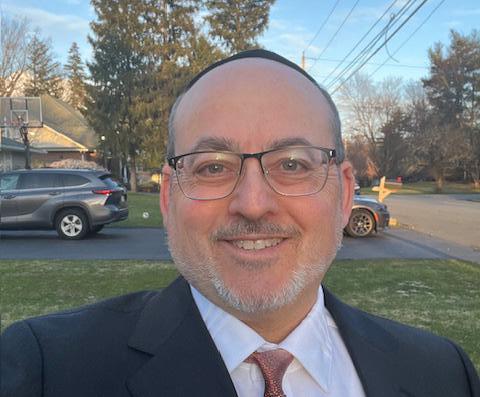
How about this one? I was in a supermarket, and they have a minyan for mincha each day. As I stood there, I looked around and took note of the shelves stocked so abundantly with copious amounts of different foodstuffs. It made me very grateful to be part of a world where Hashem showered us with so much good.
After mincha, I mentioned to one of the other fellows how I was so moved by it that when I said, “Modim” thanking Hashem, it was much more meaningful. He heard what I said, then said, “Yes, and another thing. Did you see that during Kedusha a boy came over and took a drink from the shelf? Why can’t you stop for a minute and say Kedusha?” How he got from what I said to what he said, and thought it was in the same vein, I have no idea. I said to him, “Well, most likely, that teen was so focused on grabbing the drink he may not even have heard or realized that we were saying Kedusha.” The man looked at me and said, “You’re like the Berditchever,” referring to R’ Levi Yitzchak of Berditchev, who was known to seek out the best in people and give them the benefit of the doubt. I’m not sure that’s true, but I do know that there’s always more
than one way to look at things.
When someone got mad at his cousin for ignoring him when he had a flat tire, and the cousin drive right by, I asked, “How do you know he saw you? Maybe he didn’t recognize you.” The answer was a definitive, “I KNOW he saw me.” OK, that’s obviously a bedrock reason.
But even if the cousin saw him, maybe he was in a hurry to get somewhere and couldn’t stop, not even for a minute. Or maybe the cousin saw him with the flat tire and knew he couldn’t help, so he continued on his way.
Maybe the cousin with the flat had made a flippant comment to the other one, and he was still feeling the sting. He was blaming the cousin for being mean by not stopping, but HE was the one who had been insensitive first!
There are so many ways to look at things that we should never be ready to rule or finalize a judgment until we talk to the other person, and try to understand what happened, like the Rav said to me. When we hear an opinion or comment, we should consider whether we have all the information, or if maybe the other person could offer some other insight, like R’ Levi Yitzchak would have.
It’s fine if you want to take control of the situation and say, “I’ll be the judge of that!” Just remember that being a judge means not jumping to conclusions, and exploring all possibilities before you do.
© 2025 – All Rights Reserved
Did you enjoy this column? Feedback is welcome and appreciated. E-mail info@JewishSpeechWriter.com to share your thoughts. You never know when you may be the lamp that enlightens someone else.
















By Mayor Scott Singer
In case you haven’t heard, our city is celebrating its 100th birthday in May. In honor of this milestone occasion, we have hosted and will continue to offer a series of events that honor our past, embrace our present, and get us excited for our bright future.
We hope you are enjoying the throwback welcome to Boca Raton sign at Sanborn Square and have had a chance to check out one of our Centennial-themed events like January’s Boca Street Fest, our State of the City and Community Celebration, or the Centennial activation “100th hole” station at the James Hardie Invitational Golf Tournament.
If you missed out on the fun so far, the month of May is when we will commemorate our big day! Save Memorial Day weekend for a birthday bash. We have plans for a headline concert on Saturday, May 24 and a drone show on Sunday, May 25.
The city was officially incorporated in May 1925, and the Boca Raton back then was a much different city than the one we relish. With our land located below areas prone to frost in the winter, we were a haven to farmers who wanted to grow pineapples, strawberries, peppers, and many other crops.
One hundred years ago our city was a farming community of a few hundred people. Today, we are 100,000 people strong and growing with many industries and companies proudly calling Boca Raton their home.
Thanks to world-renowned architect Addison Mizner, Boca Raton was elevated from its rustic roots as he envisioned creating a premiere resort town.
As Mizner set out to create his dream city, it soon became a reality as more people called our subtropical paradise home.
Our population began to boom, and that growth continued as we became a haven for innovation. The land that now houses Florida Atlantic University is where the Army trained its airmen on top-secret radar technology to help win World War II.
A few decades later, Boca Raton welcomed IBM, which transformed our world with the first mass-market personal computer.
Now, we are attracting billions of dollars of investment throughout our city. The former IBM site is

poised to undergo a massive transformation. Known as BRiC, the Boca Raton Innovation Campus has bold plans to become a “micro-city” where residents can live, work, and enjoy amenities all on-site.
The city is pursuing a rebirth of our downtown government campus. Rather than just replace our outdated and failing city hall and community center, we are planning for our future by investing in workspaces and homes for our growing base of talent.
We have much to be proud of this year as we embrace 100 years of history. I hope you can join us over Memorial Day weekend for our birthday events. Please visit myboca.us for more information.




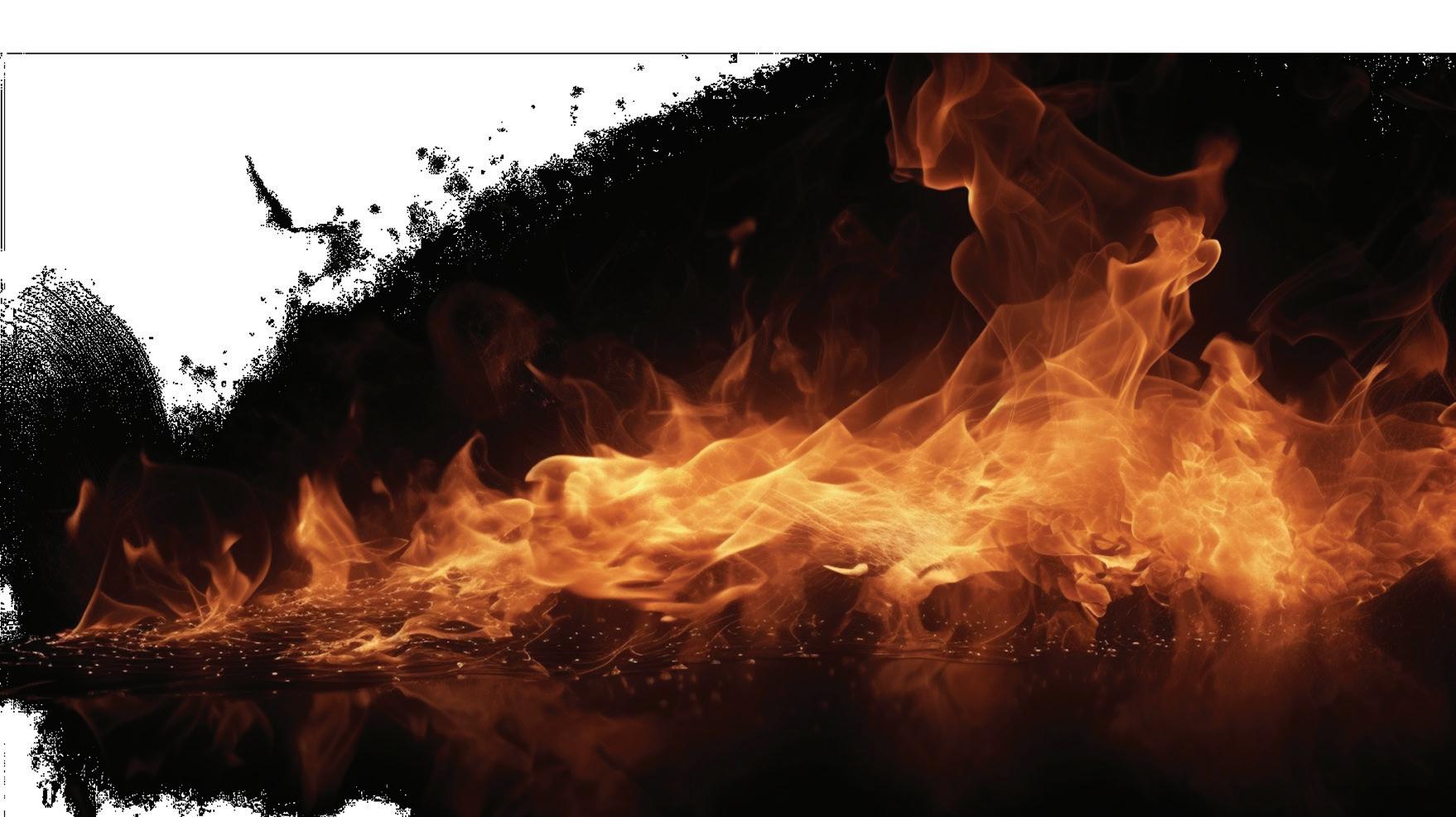

On Monday night, March 31st, Miami Beach lit up with emotion and energy as Hanan Ben-Ari took the stage for a major concert that brought the crowd to life. The atmosphere was electric. Fans filled the venue, singing along with passion, cheering after every song, and sharing a deep connection with the artist.
It wasn’t just another concert. It was a night charged with meaning. Hanan paused during the performance to share something personal and heartbreaking: some members of his production team are currently being held hostage. He asked the audience to remember them in their prayers and not to forget their faces. The emotion in his voice was unmistakable.
He also shared that their former concert manager was tragically killed on October 7th. That moment of remembrance was heavy, but it only deepened the feeling of unity among the audience.
Despite the sadness, the overall tone of the evening remained uplifting. The music was powerful. The crowd sang every word. It was a gathering of hearts, a celebration of resilience, and a night many will not forget.
An unforgettable night in South Florida.















In just a short time, Shorashim Academy has established itself as a leading choice for families seeking a top-tier secular education within a nurturing environment rooted in strong Jewish values. The school operates under its core principles—safety, respect, and responsibility—providing an exceptional educational experience that blends rigorous academics with an unwavering commitment to Jewish identity.
Shorashim Academy is the brainchild of its visionary founders, Rabbi Dr. Gur Berman, Head of School, and Rabbi Isaac Melnick, Executive Director. Their shared mission is to address one of the most pressing challenges in the Jewish community today— the rising number of Jewish children enrolling in public schools.
A Solution to a Growing Challenge
Rabbi Dr. Berman, with over a decade of leadership experience in the public school system, understands the concerns many parents face. “Many families are deeply worried about both the rising cost of day school tuition and the quality of secular education,” he explains. “At Shorashim Academy, we meet the highest academic standards—comparable to an A-rated public school—and our test results prove it.”
To make quality Jewish education accessible, the academy has partnered with private institutions to offer highly affordable tuition. In many cases, families pay less than they would for after-
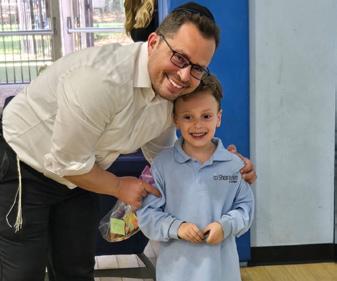

care at a public school, with some tuition rates dipping below $200 per month. “Public schools often dismiss as early as 2:00 or 2:30, and aftercare can cost upwards of $300 a month,” Rabbi Dr. Berman points out. “At Shorashim Academy, families coming from public school often pay significantly less for a full day of immersive Jewish and secular education.”
Removing Barriers, Making Education Accessible
Rabbi Isaac Melnick emphasizes the school’s commitment to eliminating obstacles for families considering a private Jewish education. “Our goal is to remove all friction. We don’t want there to be any reasonable excuse for a family to send their child to public school instead of Shorashim Academy,” he states.
The academy welcomes prospective families with open arms—offering free tours, waiving application and assessment
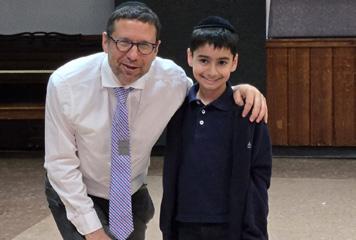
fees, and ensuring financial flexibility. “Come see the school for yourself,” Rabbi Melnick encourages. “We believe you’ll love what you see. And I personally guarantee that we will work with you to make tuition manageable, so your children can receive the education they deserve.”
A Thriving Campus and Growing Community
Shorashim Academy is located on the sprawling 16-acre Soref JCC campus in Plantation, Florida. Students benefit from outstanding facilities, including an indoor basketball gym, spacious athletic fields, and a secure learning environment. To accommodate families from across South Florida, the school will offer bus transportation from Aventura, Hollywood, and Cooper City next year. Additionally, parents from Coral Springs, Parkland, and Weston have organized carpools, further expanding accessibility.
For families seeking a school that prioritizes both academic excellence and strong Jewish values, Shorashim Academy is the answer. To learn more or schedule a tour, visit shorashimacademy.org today.

By Dr. Sarah Rosanel, MD FACC, Concierge Physician in Miami Florida - Internal Medicine Specialist/ Family Medicine and Cardiologist
Staying healthy during Pesach can be challenging, especially with matzah-heavy meals, increased sodium, and rich foods.
Here’s a 10-point guide from a cardiologist and preventive medicine perspective to help you enjoy the holiday while protecting your heart and overall health.
1. Balance Matzah Intake
Matzah is constipating and high in refined carbs, which can spike blood sugar. Stick to whole wheat or spelt matzah when possible and balance it with fiber-rich foods like vegetables, nuts, and fruits to keep digestion moving.
2. Watch Sodium Levels
Many kosher-for-Pesach processed foods (soup mixes, deli meats, sauces) are loaded with salt, which can raise blood pressure. Use herbs, lemon, and spices instead of salt for flavor.
3. Prioritize Lean Proteins
Brisket and fatty meats are traditional but can be heavy on saturated fat. Balance meals with:
• Lean proteins like chicken, turkey, fish, or egg whites
• Plant-based proteins (nuts, seeds, quinoa)
4. Control Portion Sizes
It’s easy to overeat during meals. Use a smaller plate, eat slowly, and listen to your body to avoid feeling sluggish and overfull.
5. Eat Plenty of Vegetables
Make half your plate nonstarchy vegetables (salads, roast-

ed veggies, soups). This helps with digestion, stabilizes blood sugar, and provides essential fiber, antioxidants, and nutrients.
Pessach treats—macaroons, cakes, and potato-based dishes— can cause blood sugar spikes and contribute to weight gain. Opt for:
• Fresh fruit instead of sugar-heavy desserts.
• Healthy fats like avocado, nuts, and olive oil instead of fried foods.
Between wine at the Seder and constipation from matzah, hydration is key. Aim for at least 8-10 cups of water daily and balance wine intake with extra water. Herbal teas and lemon water can also help digestion.
Avoid the post-meal slump by taking a 15 minute walk after meals to help with digestion and blood sugar regulation. Even light movement—walking, stretching, or bodyweight exercises—makes a difference.
Preparing for Pessach is stressful, and lack of sleep can increase cortisol (stress hormone), blood pressure, and cravings. Prioritize at least 7 hours of sleep per night and take moments to breathe, relax, or delegate tasks.
Matzah, eggs, and rich foods can lead to bloating and heartburn. Avoid eating large meals late at night, eat slowly, and consider digestive-friendly options like herbal teas (ginger, mint) or probiotics (if part of your diet).
Dr. Sarah Rosanel is a dedicated concierge physician based in Miami, FL, specializing in personalized healthcare tailored to the unique needs of her patients. With a holistic approach that blends traditional medicine, lifestyle interventions, and functional medicine, she empowers individuals to achieve optimal health and well-being.
As an expert in Concierge Medicine & Cardiology, Dr. Rosanel integrates cutting-edge medical treatments with holistic methodologies, ensuring comprehensive care that goes beyond symptom management to address the root causes of health concerns.
Beyond her medical practice, Dr. Rosanel is a devoted mother to Ariel, Zev, and Shirley, balancing her passion for healing with family life.
�� Book an Appoi n tme n t: Cal l or tex t (646) 467-4368
�� Miami, Flo r id a | �� i n fo@D r Rosa n el.com







This week some of our students went on a chesed trip to New Orleans where they rolled up their sleeves and got to work. These pictures capture the process—cleaning, sanding, priming, and painting barrels that will be repurposed for water conservation, helping prevent subsidence, and reducing landfill waste. They also took on house painting, bringing fresh color and renewal to homes in need.





Once a year opportunity! Make a blessing on fruit trees that can bring blessings for you and your family! We have a beautiful mango tree in the ground and 2 small perfectly blooming trees in planters, at Chabad Chayil, just left of the temporary entrance on the co r n e r of NE 26th Ave & 212 Te r r . Although we t r y to do any Mitzvah at our earliest opportunity, the Mitzvah can be done any time during the month of Nissan.
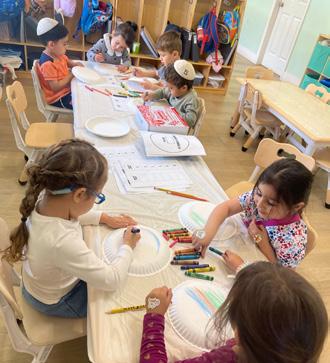






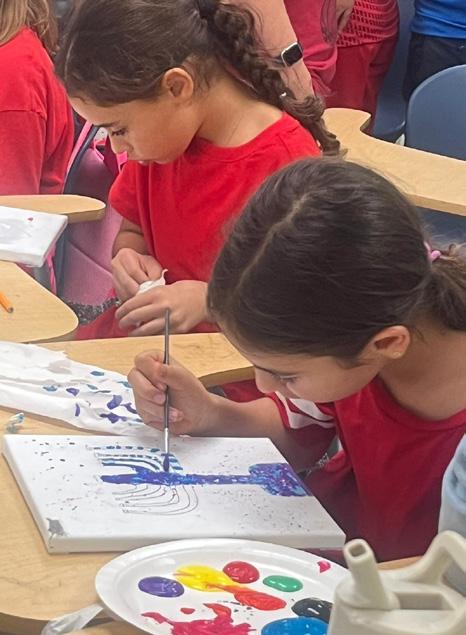
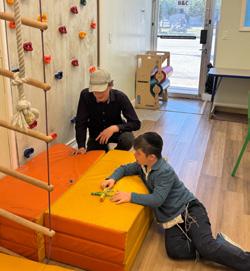


While we always enjoy our time at JEMS, this week’s visit was beyond special. With a little help from their friends, the boys actually built their own catapults. Their combination of skills and determination produced great results.


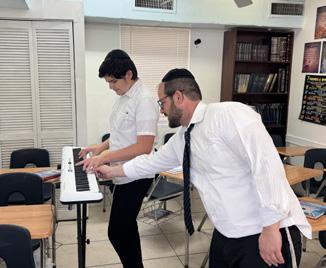
Through our elective courses, students can learn about the world of real estate, business or computer coding, to name a few. They can also grow their musical talent in the music class that it given by Mr. Michael Sapoznik, which is always a popular choice.




The Zionist Organization of America (ZOA) Florida held its highly anticipated Superstar Gala on Sunday evening, March 30, 2025, at the prestigious Raymond F. Kravis Center for the Performing Arts in West Palm Beach. With the event completely sold out well in advance, the evening celebrated some of the most passionate voices in support of Israel and Jewish advocacy.
Honorees included Ambassador Danny Danon, renowned legal scholar Professor Alan Dershowitz, community leader Lauren Gross, Rabbi Moshe Scheiner of Palm Beach Synagogue, and Congressman Byron Donalds (R-FL). Also in attendance were Mark Levin, Gary L. Schottenstein, media personality Siggy Flicker, and ZOA National President Morton A. Klein.
The event brought together hundreds of committed Zionists and Jewish community members for a night filled with inspiration and purpose. Each honoree spoke passionately about the importance of Jewish identity, strength, and unwavering support for Israel, especially during times of rising antisemitism and global unrest.
Security at the gala was tight, with strict entry protocols including ID checks and a ban on large bags. Despite the precautions, the atmosphere remained warm and celebratory.
Robert S. Weinroth and his wife Deborah were among the attendees, praising the event as “an exceptional evening with amazing speakers” on social media. The evening’s program spotlighted the ZOA’s 128-year legacy of bold
pro-Israel activism, including its role as the first official Zionist organization in the U.S.
Founded in 1897, the ZOA remains a frontline voice defending Israel’s legitimacy, speaking in synagogues, schools, and public forums across the nation. Through its ongoing work in education, advocacy, and media, ZOA continues to be a powerful force for Jewish pride and the safety and security of the Jewish people.
The Superstar Gala was more than an event—it was a declaration of strength and solidarity. From the powerful speeches to the distinguished guest list, the night marked another milestone in the proud history of the Zionist Organization of America.
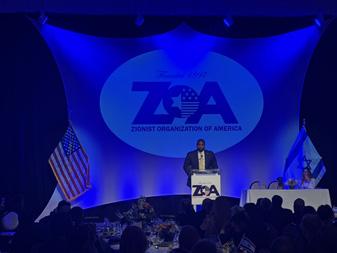
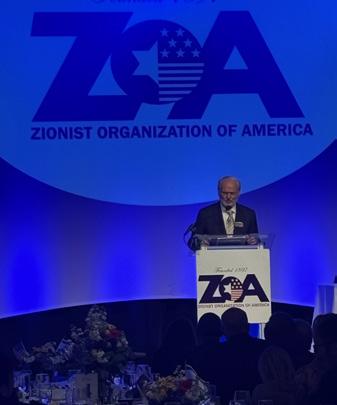

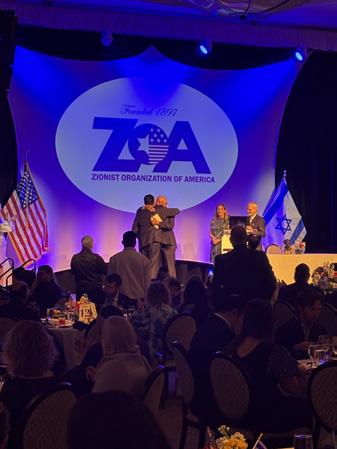

Understanding Medicare coverage can be challenging. Getting the right plan with lifelong Medicare guidance is easy! Call now to get answers to your Medicare questions






















• DINE-IN
• SUSHI PLATTERS
• CATERING SETUP
• LIVE SUSHI STATION
• DELIVERY & PICKUP 10% DISCOUNTIF YOU BRING IN THE COMMUNITY VOICE MAGAZINE

1. I’m soft and wrinkly, and I live in your head. I help you learn and get out of bed. What am I?
(The brain)
2. When you remember your birthday or a song, I’m the one who keeps it all along. What am I?
(Memory — the part of your brain that stores information)
3. I help you feel happy, scared, or mad. When you laugh or cry or even feel sad. What am I?
(The emotion center — mostly in the middle of your brain, like the amygdala)
4. I help you balance and stand up straight, Walk on a line or roller skate! What part of you am I?
(The cerebellum — the part of your brain that controls balance and movement)
5. I send your body messages all day, To help your hands and feet obey. What am I?
(Nerves — the brain’s messengers that tell your body what to do)
6. I help you talk and solve a clue. Planning and focus? That’s me too! What part am I?
(The frontal lobe — the front of your brain that helps with thinking and speaking)
7. You look with your eyes, but I help you see Turning pictures into memory. What part of you am I?
(The back of the brain / occipital lobe — where vision is processed)
8. When you’re fast asleep, I’m wide awake — Making dreams while you take a break. What am I?
(The dreaming brain — especially active during REM sleep)
9. You hear a sound, you turn your head I help you listen to what was said. What part of you am I?
(The side of the brain / temporal lobe — it helps you hear and understand words)
10. You’re reading this riddle and thinking it through — Solving it means I’m helping you! What part of you am I?
(The thinking brain / cortex — where your brain solves problems and learns)







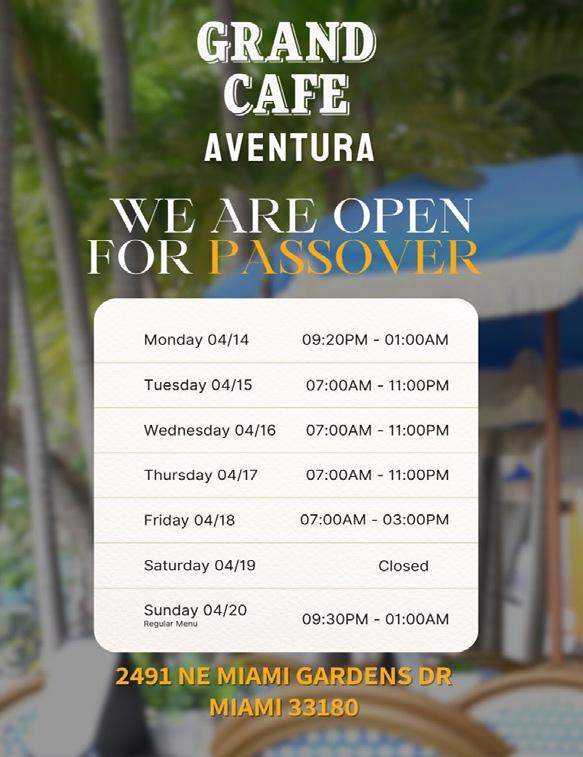
1. Your brain can’t feel pain! Even though it helps you feel everything else, your brain has no pain sensors. That’s why doctors can do brain surgery while you’re awake!
2. Your brain is about 75% water.
That’s right—your brain is super squishy and needs water to work properly. So drink up!
3. You have about 100 billion brain cells.
That’s more stars than in our galaxy! These cells help you think, move, and remember things—even your lunch from last week.
4. Your brain uses electricity. Tiny electrical signals travel between brain cells super fast—up to 268 miles per hour! That’s faster than a race car.
5. Your brain never sleeps. Even when you’re dreaming, your brain is working hard. It helps you breathe, keeps your heart beating, and stores memories from the day.

6. Learning new things makes your brain stronger. Just like lifting weights builds muscles, reading and learning helps grow new connections in your brain. So go grab a book!
7. Your brain is faster than a computer. It can process information in a split second—like recognizing a face or dodging a ball without even thinking!
8. Your brain grows until your mid-20s. Even though you’re born with most of your brain cells, the brain keeps developing and getting smarter as you grow up.
9. Laughing is good for your brain. When you laugh, your brain releases happy chemicals that help you feel calm and connected to others.
10. Your brain controls everything—even when you blink.
It tells your eyes when to blink (about 15–20 times per minute) without you even noticing.

First place: $30 gift card | Second place: $20 gift card | Third place: $10 gift card
Email your artwork to editor@tsfcommunityvoice.com
Make sure to include your name, age and city. Entries must be received by April 6.
This type of contest encourages creativity, education and community engagement. It allows kids to express themselves through art, and it also provides an opportunity for their work to be showcased in the magazine.

Sponsored by: SMASH HOUSE BURGERS smashhouseburgers.com (305) 351- 9545


-Canvas -Painters Tape -Plaster of Paris -Small and Large Paintbrushes -Two Paint Sponges -Paint: White, Gold and Brown -A Measuring Cup -Blue Food Coloring -Blue Glitter and Fruit Charms -Sand -Glue -Pen -Ruler -Plate

WIN A PRIZE!
Finish the weekly project, snap a pic, and email us at info@jcm.museum for a chance to win a prize. Let’s get creating!

The Meraglim returned with negative reports about Eretz Yisroel, claiming that the Kenaanim were too powerful to defeat. Yehoshua & Kalev opposed this by telling the Jewish people, “Do not rebel against Hashem, and you will not fear the people of that land, for they are our bread…” This statement reflects a central theme: if the Jews would not rebel against Hashem and instead follow His instructions, they would have no reason to fear the land’s inhabitants. The phrase “our bread” symbolized that Hashem would lovingly and easily enable the Jews to conquer the land, just as He had lovingly provided them with Mohn—the equivalent of bread.
When Sarai’s name was changed to Sara, the Yud soared before Hashem and asked, “Did You remove me from Sara the Tzadekes’ name because I am the smallest of the letters?” Hashem promised the little letter that it would later be added to the beginning of Yehoshua’s name (since his name was changed from Hoshea to Yehoshua).
Yehoshua Bin Nun was the devoted student of Moshe Rabbeinu and eventually became his successor. He was one of the Meraglim sent to scout Eretz Yisrael and, along with Kalev, were the only ones to return with a positive report. As the leader of the Jewish people, Yehoshua led them into battle to conquer Eretz Yisrael, which included the miraculous fall of Yericho’s walls and the incident in Givon, when he famously stopped the sun. Rachav played a key role in the Yericho story. After she converted, Yehoshua married her.
When facing a difficult situation, turn to Hashem. There is no reason to be afraid, knowing that He will help you. For example, if you’re afraid of the dark, you can say Shema. Or, if you feel nervous about meeting someone new, you can focus on treating them with Ahavas Yisrael. In both cases, trust that Hashem will help make the experience easier.
When you feel afraid, how can you turn to Hashem in these times?

Color in the Shivas Haminim template. Then, cut out each picture and use the glue stick to attach each pair so it’s double-sided.

Cut out the plastic pictures into square shapes.


Cut out the middle of 2 plates to create a flat piece of plastic. Use a paintbrush to spread glue over 1 of the plastics and stick each colored picture on top, ensuring a half-inch space around each. Paint a thin layer of glue over the pictures so they are firmly stuck to the plastic.

Pour 3 oz of glue on the last plate. Tilt it around so the glue fills the plate. Center the paper rectangle under the last clear plate to use as a rectangle guide, and place the Shivas Haminim pieces inside the plate, within the guidelines of the rectangle.
Let it dry for 3 days or till completely dry. Then take the dry piece of glue off the plate and cut it to the shape of a rectangle.




Cover the second plastic with glue and cover the pictures. Press down on all sides. Let dry for 3 minutes.

Pour 1 oz of glue over the pieces. Use a toothpick to arrange the pieces and to pop any bubbles in the glue. Sprinkle some glitter over the bookmark.

Punch a hole in the top center and string the ribbon through the hole and knot it. Curl the ribbon with a pair scissors for an extra flair!
-Printed Template -Markers: Yellow, Red, Purple, Brown, Light Green, and Dark Green
-Big Paintbrush
-6 oz Clear Glue -Glue Stick
-6”x 2” Paper
-3 Clear Plastic Plates
-Gold Glitter
-12” of Gold Ribbon
-Toothpick
-Hole Puncher
-Scissors

By Jamie Geller

A traditional recipe made easy by using a house hold staple like cream cheese in place of sour cream.
Ingredients
• 6 (8-ounce) Idaho potatoes
• 1 tablespoon canola oil
• 1 medium onion, coarsely chopped
• 1 (1-pound) bag frozen broccoli florets, thawed
• 1 cup Temp Tee Whipped Cream Cheese
• 1 tablespoon kosher salt
• 1 teaspoon freshly ground black pepper
• 2 cups Les Petite Fermieres Shredded Cheddar
Preparation
1. Preheat oven to 350° F.
2. Prick the potatoes with a fork and cook in the microwave on high for 12 minutes. While potatoes are in the microwave, heat oil in a large sauté pan over medium heat. Sauté onions in oil until translucent, about 5 minutes. Stir in broccoli.
3. When potatoes are done, cut them in half and scoop
out the flesh. Mash the flesh with cream cheese, salt, and pepper; and put the mixture back into the skins, filling them about three-quarters full. Distribute broccoli and onions evenly among the potato halves and top with cheddar.
4. Bake for 15 to 25 minutes or until cheese is bubbly and the potatoes are cooked through.







By Yitzchak Steinberg

As an Israeli attorney specializing in representing foreign residents purchasing real estate in Israel, I’ve observed a growing trend of international buyers investing in the Israeli property market. Whether you’re looking for a vacation home, an investment property, or planning your aliyah, understanding the legal protections available to property buyers in Israel is essential.
Israel has developed robust legal mechanisms to protect property buyers during the sometimes lengthy period between signing a purchase agreement and the final registration of ownership rights. Two primary protections stand out: the Cautionary Note (He’arat Azharah) for existing property purchases and the Sale Law Guarantee (Arvut Chok Mecher) for new construction purchases from developers.
The Cautionary Note: Your First Line of Defense
When purchasing an existing property in Israel, one of the most significant protections available is the Cautionary Note (He’arat Azharah). Unlike the U.S. real estate system, where escrow provides interim protection, in Israel, the Cautionary Note serves as a powerful legal safeguard.
A Cautionary Note is a formal notice registered with the Land Registry Office (Tabu) that attaches to the property record, indicating that a transaction is in progress. This registration effectively prevents the seller from selling the property to another party or encumbering it with additional liens or mortgages.
• Creates a legal barrier preventing the property from being sold to a third party
• Protects against new liens or mortgages being registered against the property
• Establishes your priority rights as a buyer, even in cases of the seller’s bankruptcy
• Remains valid until the final transfer of ownership is completed
Upon signing the purchase agreement, your attorney will file the Cautionary Note on your behalf. This critical step should be completed immediately after signing and making the initial payment to ensure maximum protection.
Developer Purchases: The Sale Law Guarantee
When purchasing a property from a developer or contractor (a property under construction or not yet built), Israel offers another powerful protection mechanism: the Sale Law Guarantee (Arvut Chok Mecher).
The Sale (Apartments) (Assurance of Investments of Persons Acquiring Apartments) Law of 1974 requires developers to provide buyers with one of several financial guarantees to secure the money paid toward the purchase.
1. Bank Guarantee: The most common form, where a bank guarantees the return of your investment if the developer fails to deliver the property.
2. Insurance Policy: Similar to a bank guarantee but issued by an insurance company.
3. Property Registration: In rare cases, the developer may register your ownership rights directly even before construction is completed.
4. First Lien: A first-ranking lien on the property registered in your favor. These guarantees ensure that even if the developer encounters financial difficulties or bankruptcy, your investment remains protected. The guarantee typically covers all amounts paid (including VAT) and allows you to recover your funds if the developer fails to deliver the apartment as promised.




As a foreign buyer, several additional factors require attention:
1. Currency Transfer: Work with specialized financial services that manage international transfers efficiently and cost-effectively.
2. Tax Implications: Understand both Israeli taxes (purchase tax, capital gains) and potential tax consequences in your home country.
3. Power of Attorney: Having an irrevocable power of attorney allows your Israeli attorney to act on your behalf throughout the process, which is particular-
ly important if you don’t reside in Israel.
Israel’s property protection mechanisms provide substantial security for foreign buyers, often exceeding protections available in other countries. The Cautionary Note for existing properties and Sale Law Guarantees for new developments create a solid foundation for your investment.
As with any significant investment, working with experienced legal counsel familiar with both Israeli real estate law and the unique needs of foreign buyers is essential to navigate the process
successfully and ensure all protective measures are properly implemented.
For foreign residents considering a property purchase in Israel, understanding these protections is the first step toward a secure and successful investment in the Holy Land.
Yitzchak Steinberg is a legal expert specializing in representing foreign residents in Israeli real estate transactions. Over the years, he and his team have successfully guided thousands of international buyers through property acquisitions in Israel. His extensive experience spans clients from across the globe, making him a trusted advisor in navigating the complexities of Israeli real estate law for non-residents. office@ys-law.co.il +972-2-5002923 Watsapp : +972-53-277-5431




3 bedroom 2 bathrooms
Appliances included In ground pool
Convenient location


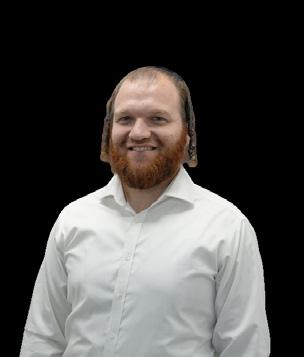

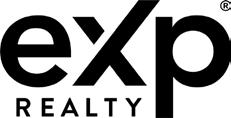



Apartment available: 1 bedroom 1 bathroom
Less than 15 minutes to the beach
Next to shopping areas
Near places of Worship





Here’s What You Need to Know Before It’s Too
Tax season is in full swing—and for many individuals and business owners, it’s bringing more stress than clarity.
Some people are running out the clock, waiting until the last minute to file. Others already filed—or started the process—but walked away feeling unheard, undervalued, or worse… uncertain about whether their return was even done correctly.
If that sounds familiar, you’re not alone. And more importantly, you don’t have to settle.
At Signature CPAs & Advisors, we’ve helped countless clients get back on track—filing accurately, reducing their tax burden, and finally feeling confident in the process. Whether you’re behind on filing, confused by complex income streams, or simply tired of feeling like just another number, this tax season can still be different.
If you haven’t filed yet, there’s probably a reason:
• You’re too busy running your business or managing work/life to deal with paperwork.
• You’ve had a bad experience in the past and you’re dreading going through it again.
• You don’t feel confident that your current CPA or preparer really understands your situation.
• You suspect you’re overpaying, but no one’s ever shown you how to fix it.
We get it. And at Signature CPAs,
By Signature CPAs & Advisors

we’ve built our entire process to eliminate those roadblocks.
Too often, tax preparers are reactive. They plug in numbers and move on. No strategy. No planning. No explanation.
That’s not how we work.
At Signature CPAs & Advisors, we take a proactive approach built on three pillars:
You’re not just another client in a long line. We invest time in understanding your goals, your financial picture, and your unique tax challenges. Whether you’re a high-income earner, a small business owner, or someone with diverse investments, we treat your return like it matters—because it does.
Filing is just the beginning. We
help you look at the big picture— planning ahead for future savings, structuring your income more efficiently, and identifying opportunities other preparers often miss. We’ve helped clients:
• Reclaim thousands in overpaid taxes through amended returns
• Set up proper business structures to reduce liability
• Plan smarter quarterly payments to avoid penalties
• Leverage tax-advantaged investments or deductions
We’re not just here in March and April. Our clients have access to us year-round—for everything from tax questions to business advisory services. This continuity gives you peace of mind and better results over time.
If you haven’t filed yet, there’s no shame in it. But the clock is ticking, and rushing through it with the wrong preparer can cost you far more than you think. And if you’ve already filed but something doesn’t feel right? We can review your past returns, uncover missed opportunities, and amend if needed. It’s more common—and more impactful—than people realize.
Whether you’re filing as an individual, managing a growing business, or simply want a second opinion, we’re here to help you take control and finish strong.




By Shmuel Shayowitz
Not long ago, I was asked a question during an interview that stuck with me long after the microphone stopped recording: “What advice would you give your younger self?”
At first, it felt like one of those generic reflection questions. But the more I sat with it, the more it sparked something deeper. It made me rewind the clock and revisit a younger version of myself - 21 years old, full of ambition, energy, and drive - but also unsure, learning through trial and error, and figuring things out on the fly.
If I could sit down with that younger version of me today, there are a handful of ideas I would share … hard-earned lessons that weren’t just about business … but about life. These are lessons I didn’t just hear or read somewhere but lived through, wrestled with, and eventually learned to embrace.
This is part one of a series I’m calling Worldly Advice to My Younger Self. These aren’t just philosophies – they are life-shaping principles. The kind that shaped my perspective, my approach, and ultimately, my life. And if they help someone else navigate their own journey with a little more clarity and confidence, then it’s a conversation worth having.
Success is accomplishing what you set out to achieve. Forget the outside noise. Don’t measure success by someone else’s metrics. If you set a goal - even a small one - and you achieve it, that’s success. Celebrate it. Stack those wins. It builds momentum and confidence. Over time, your goals will grow,
and so will your belief in what’s possible. But always remember: it’s your race and your markers.
Leverage is a powerful tool. Use it wisely and liberally. This was a game-changer for me. In the early days, I thought I had to do everything myself - prove I could carry the weight. But real growth happens when you learn to leverage. Use financing leverage strategically. It’s a huge multiplier. Build systems based on leveraging hierarchy. Most importantly, learn to delegate. Invest in people and help them shine. Their success is ultimately your benefit if you are leveraging them properly. Leverage doesn’t make you weaker - it enables you to scale - personally and professionally.
Success is about getting comfortable being uncomfortable. Here’s the truth: most people aren’t paying that much attention to you. So stop overthinking every move. Step into the room, ask the question, make the call, take the shot. You’re going to get rejected. You will face setbacks. That’s where the growth lives. If you’re not a little uncomfortable, you’re probably not growing.
Learn about compounding. Use the principles of compounding in everything you do. This applies to investing - but even more so to self-improvement. Start early. Be consistent. Read the books. Have the conversations. Do the reps. Show up. The results aren’t instant,
but over time they multiply. Be just a little better today than you were yesterday. That 1% growth adds up - and then it takes off.
My son introduced me to this idea, and it resonated deeply with me… What you don’t change, you choose. If you’re unhappy with something and you do nothing about it, you’re choosing it. That goes for relationships, jobs, diet, habits - everything. It’s a powerful reminder that we’re always in control. If you want something different, be bold enough to make a change.
These are the first five principles I would hand to my younger self, but truthfully – they are keepsakes I use today. No matter how far we’ve come, progress never stops. Stay tuned for part two. (PS, I would love to hear what you would tell your 21-year-old self!)
Would you rather always be 10 minutes late or always be 20 minutes early? Please let me know if you have a good “Would you rather” question, and we will highlight your submission.
Shmuel Shayowitz (NMLS#19871 ) is a highly regarded Real Estate & Finance Executive, Writer, Speaker, Coach, and Advisor. He is President and Chief Lending Officer of Approved Funding, a privately held national mortgage banker and direct lender. Shmuel has over twenty years of industry experience, holding numerous licenses and accreditations, including certified mortgage underwriter, licensed real estate agent, residential review appraiser, and accredited investor, to name a few. Shmuel has successfully navigated through many changing markets and business landscapes, making his market insights and experience well-coveted within the real estate industry. He can be reached via email at Shmuel@approvedfunding.com.
LIMITED INCOME - SELF EMPLOYED - IMPERFECT CREDIT - ALL CONSIDERED
PRIMARY PRIMARY RESIDENCE RESIDENCE
SECOND SECOND HO HOMES MES
IINVESTMENT NVESTMENT PROPERTIES PROPERTIES

